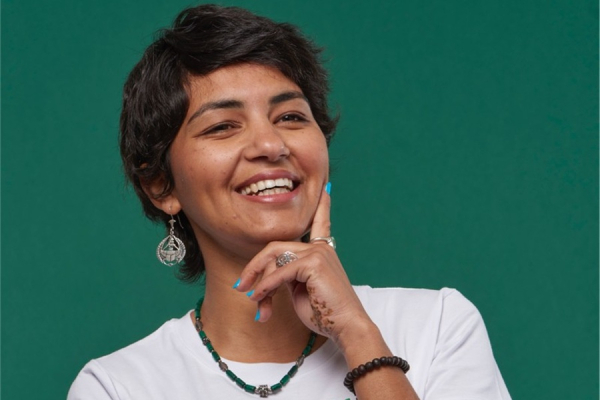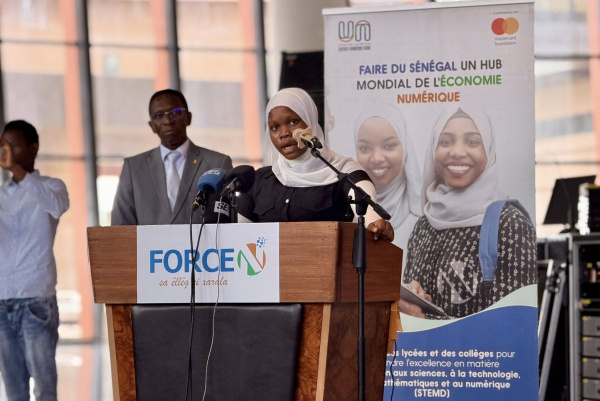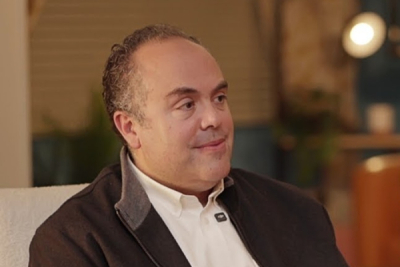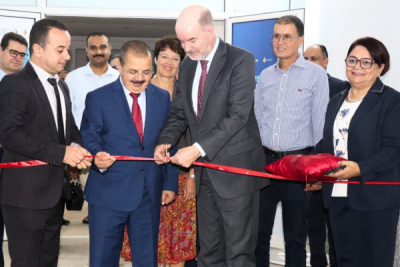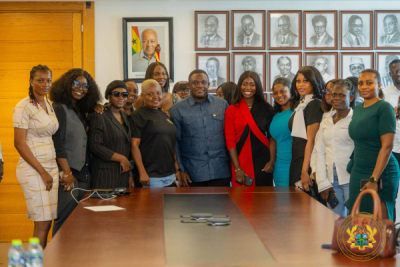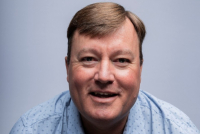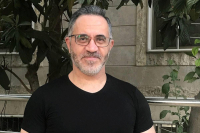Moroccan agri-food engineer and entrepreneur Wissal Ben Moussa co-founded Sand to Green in 2022 and serves as its agricultural director. The agri-tech startup focuses on regenerative farming projects aimed at restoring degraded soils and improving agricultural resilience.
Sand to Green builds its models on environmental data analysis, guiding farmers and industry players toward resilient, traceable systems with measurable climate and economic impact.
The company developed RegenWise, a software platform that evaluates land characteristics and generates project scenarios including crop selection, plant combinations, spatial layouts, and irrigation systems. The tool provides technical guides for implementation, tracks plantation progress, and produces reports aligned with ESG certification standards. It also supports processes related to carbon credit initiatives.
In September 2025, Sand to Green secured third place in the national round of the Orange Social Venture Prize for Africa and the Middle East (POESAM). The startup also joined the AI Founder Sprint program at INSEAD’s AI Venture Lab and was named a finalist in the Food Tech Challengers competition.
Ben Moussa graduated in 2012 as an agri-food engineer from the Hassan II Agronomic and Veterinary Institute in Morocco and earned a master’s degree in innovation management for agro-industries from AgroParisTech in 2013.
Her early career included research at the INRH’s specialized seafood processing center in 2012 and a junior consulting role at Quaternaire in 2013. In 2014, she joined the Moroccan Innovation Center as a performance and development officer. From 2015 to 2017, she worked at Unilever Morocco in food R&D, supporting the local head of the department.
This article was initially published in French by Melchior Koba
Adapted in English by Ange Jason Quenum
• Senegal launched a $233 million national program to train 105,000 teachers and administrators in digital tools and artificial intelligence.
• The program is part of the government’s Education Digital Strategy 2025–2029 and includes distributing computers to science students.
• Connectivity gaps remain a challenge, as 40% of Senegal’s population lacked internet access in 2023, according to the ITU.
Senegal’s government is accelerating its digital transformation strategy through new capacity-building initiatives. In August, authorities already organized digital training for members of parliament.
On September 30, the Ministry of National Education (MEN) officially launched a national program to train teachers in digital skills and artificial intelligence. The initiative also includes providing computers to students in science tracks. Officials described the program as the operational start of the country’s Education Digital Strategy 2025–2029, which carries a budget of CFA130 billion (about $233 million) announced in January.
The program stems from a partnership signed in March 2025 between the Ministry of National Education and the Ministry of Higher Education, Research, and Innovation. It targets 105,000 teachers and administrative staff to integrate digital tools and AI into teaching and school management.
The online training will be accessible via computers, tablets, or smartphones connected to the internet. It includes interactive content, self-learning modules, and certified assessments. Teachers will learn to adapt their methods to technological changes, use digital resources to enrich learning, raise student awareness of digital and AI issues, and strengthen cybersecurity and data protection in schools.
“The final objective of this initiative is to integrate digital tools directly into the classroom, not only to modernize teaching but also to create an ecosystem adapted to 21st-century requirements,” the ministry said. “This program is not limited to teacher training. It represents a paradigm shift that will allow Senegalese students to move from being simple consumers of technology to becoming creators and innovators.”
Successful implementation depends on several factors. Access to compatible devices, the cost of internet connections, digital literacy, and telecom coverage remain significant barriers. According to the International Telecommunication Union (ITU), nearly 40% of Senegal’s population lacked internet access in 2023.
This article was initially published in French by Isaac K. Kassouwi
Adapted in English by Ange Jason Quenum
Moroccan entrepreneur Mohammed El-Beltagy has built his career around applying artificial intelligence to business performance. He founded and leads Optomatica, a deep-tech consulting firm specializing in AI, machine learning and advanced optimization.
Optomatica focuses on accelerating the transition from ideas to final products by developing tailored AI systems that improve decision-making and data management. The company positions itself as “AI-First” and adapts its technologies to operational contexts across industries.
Founded in 2003, Optomatica operates in fintech, sports technologies, digital health, conversational intelligence, logistics, and process optimization. The firm aims to create practical AI applications and unlock new technical opportunities for clients and their markets.
Alongside Optomatica, El-Beltagy has pursued multiple ventures. In 2014, he co-founded Racefox, a digital coach for running and cross-country skiing. Four years later, he launched ConsultingPad, a platform linking consultants with enterprises, and joined AIM Technologies, an AI-focused firm, as a board member.
In 2021, he helped establish Optofolio, a wealth management platform; Jilatee, a circular fashion company; and DFin Holding, a fintech venture.
Since 2022, El-Beltagy has served as co-founder and chief technology officer of Flend, a financing platform that uses data and technology to support small and medium-sized enterprises. That same year, he founded Racemate, a sports technology company, where he chairs the board and serves as CTO.
El-Beltagy graduated in biomedical engineering from the American University in Cairo in 1994. He earned a master’s degree in mechatronics from Lancaster University in 1996 and a PhD in mechanical engineering from the University of Southampton in 2000.
His professional record includes senior positions in technology firms. From 2007 to 2017, he worked at Hive Streaming, a live video distribution company, as chief scientist and later as innovation director. Between 2013 and 2017, he served as innovation director at Novelari, an innovation accelerator. More recently, from 2020 to 2021, he was CTO at Elves, an Egypt-based travel app.
This article was initially published in French by Melchior Koba
Adapted in English by Ange Jason Quenum
This startup has launched an innovative legal technology, or legaltech, solution at the intersection of law and technology. It aims to serve as a localized, specialized legal AI option in Morocco.
Juridia, a digital solution developed by a Moroccan startup, is simplifying access to local laws using specialized Artificial Intelligence (AI) trained on the Kingdom’s legal corpus. The Rabat-based startup was founded in 2023 by Omar El Adlouni.
“We saw an opportunity: what if AI could simplify and centralize access to law? That's how Juridia was born, a company specializing in leveraging AI to improve access to legal resources,” El Adlouni said. “The goal was to create a platform that is not just a legal search engine, but a true conversational assistant capable of understanding legal questions and answering them with precision.”
Juridia’s AI has been trained exclusively on Moroccan legal texts, case law, and regulations. When a user poses a question, the tool provides a clear answer and includes the sourced legal excerpts (laws, decrees, and regulations) used to construct its response. Additionally, the platform can draft or rephrase contractual clauses, analyze legal risks, and ensure regulatory watch, all in multiple languages.
The solution aims to save time for legal practitioners while empowering non-specialists to better understand their rights. Amid growing focus on legal cybersecurity, compliance, and digital innovation, Juridia intends to contribute to the transparency of the Moroccan legal system.
Juridia offers tiered subscription plans to users. The “Individual” plan costs 490 Moroccan Dirhams (MAD), or about $54, per month, targeting individuals or independent lawyers. The “Professional” plan, priced at 990 MAD per month, is designed for law firms or mid-sized organizations, featuring additional functionalities and a secure collaborative space.
A bespoke, customized offering is available for large companies, which includes an Application Programming Interface (API), the integration of internal data, and personalized support.
Adoni Conrad Quenum
• Tunisia opens Smart Industry 4.0 training center in Sfax
• First 13 trainees focus on IoT, robotics, automation skills
• Part of Swiss-backed Takween program to boost youth employability
The Sfax governorate in Tunisia inaugurated a new specialized training center on Tuesday, September 30, focusing on Smart Industry 4.0. The hub aims to prepare young people for careers related to the digital transformation of manufacturing and enhance their employability in a rapidly evolving market.
Elyes Chérif, Director General of the Tunisian Professional Training Agency (ATFP), emphasized that the project directly addresses the evolving needs of Tunisian businesses, which face increasing automation and digitalization of their processes. “The objective is to equip young people with the specialized skills that correspond to the requirements of Industry 4.0 and offer them better professional integration prospects,” he stated.
The new facility will welcome a first cohort of 13 trainees selected for programs centered on automation, the Internet of Things (IoT), robotics, and the maintenance of smart industrial systems. This laboratory is the fourth of its kind in Tunisia, following centers established in Sidi Thabet (Ariana), Monastir, and Sousse.
The program is part of the Swiss-backed “Takween” program, launched in 2020. Takween adopts an innovative, work-study approach to vocational training, aiming to strengthen the employability of higher education graduates, particularly those from professional training tracks, and align young Tunisians’ skills with the standards of the Fourth Industrial Revolution.
Such initiatives are critical in Africa, where the African Development Bank forecasts that more than 30 million young Africans will enter the labor market annually by 2030. In Tunisia, a country with a young population and a changing industrial base, these specialized labs are designed to bridge the skills gap and stimulate local innovation.
With this new base, Tunisia aims to cultivate a talent pool capable of meeting the challenges of the digital revolution, fostering the emergence of technology startups, and contributing to the development of smart industry both nationally and regionally.
Samira Njoya
• TikTok to train 120 Ghanaian creators on October 12
• Sessions cover engagement, algorithms, and monetization skills
• Ghana eyes digital growth; GCB proposes creator payment system
TikTok plans to host a training session for local content creators in Ghana on October 12, an initiative designed to enhance digital skills, engagement, and monetization on the platform.
The training was disclosed by Samuel Nartey George, Minister of Communications, Digital Technologies, and Innovation, during a meeting with members of the New Media Association of Ghana, the Ghana Bloggers Association, and independent creators earlier this week.
Targeting 120 content creators, the session will be delivered by a technical team from TikTok traveling from South Africa. The training will focus on platform optimization to help participants improve their reach, engagement, and monetization strategies.
“This will be the first time a government in Ghana has facilitated TikTok’s direct engagement with local creators. The training will give you practical insights into how algorithms work, how to boost your engagement, and how to monetise effectively,” Minister Nartey George said.
The move is part of the government’s effort to support the nation’s burgeoning digital creative industry. The availability of relevant digital content is a key factor in mobile internet adoption; approximately 70% of Ghana's population were using the internet at the start of 2025, according to DataReportal.
In a related development in early September, Ghana Commercial Bank (GCB) proposed a mechanism to allow Ghanaian TikTok creators to receive their earnings securely and transparently. Leveraging its extensive network and connectivity with MasterCard, Visa, mobile money wallets, and bank accounts, GCB is positioning itself as the ideal payment gateway to facilitate withdrawals and manage earnings from creator gifts.
Isaac K. Kassouwi
Startups are reshaping Africa’s economies, generating opportunities for young people and driving into new markets. Yet their potential is still held back by funding gaps, a shortage of skilled workers and weak infrastructure.
Sub-Saharan Africa faces a spiraling youth employment crisis, with technology startups emerging as a promising, yet geographically concentrated, source of new jobs and innovation.
According to the International Labour Organization (ILO), approximately 27 million young people in the region were unemployed in 2023, representing a jobless rate of 8.9%. Compounding the issue are 62 million NEETs (Not in Employment, Education, or Training), accounting for about one-quarter of the population aged 15 to 24. With over 30 million new entrants expected to join the labor market annually by 2030, pressure is steadily mounting.
Tech's Real Impact: Job Creation Data Confirmed
Recent data confirms that African startups are increasingly impacting employment figures. The African Tech Startups Funding Report 2022 found that the 633 funded startups across the continent employed 34,201 people at the time of their first capital raise, nearly double the workforce recorded in 2021. On average, funded startups employed 54 people in 2022, up from 32 the previous year, signaling a growth in the ecosystem's robustness and absorption capacity.
Nigeria exemplifies this trend. According to Partech, its startup ecosystem alone generated over 19,000 direct jobs in 2022, with nearly half concentrated in fintechs. Egypt followed closely with 11,153 jobs recorded across 131 funded startups that year, while Kenya and South Africa also showed significant job creation levels. These figures show that startups, particularly in the most dynamic digital hubs, are already absorbing some of the young workforce often marginalized by the formal sector.
Persistent Challenges Hinder Widespread Growth
Despite these advances, significant obstacles remain. Partech’s Africa Tech Venture Capital Report 2023 highlighted that four countries—Nigeria, Egypt, Kenya, and South Africa—captured over 80% of the funding raised on the continent. This concentration excludes many young entrepreneurs in still-emerging ecosystems.
The mismatch between training and market needs is another major concern. The World Bank notes that many African companies identify the digital skills deficit as a constraint on their growth. The Brookings Institution estimates that 230 million jobs will require digital skills by 2030, generating a demand for 650 million training opportunities. Furthermore, the issue of sustainability is critical: startups, dependent on financing and markets, remain fragile and often short-lived.
A less visible but equally crucial challenge is inclusion. Barriers to entry for young people without networks or collateral, particularly regarding gender, locality (rural vs. urban), and access to finance, remain serious. Post-training support, market linkage, and sustained entrepreneurial coaching are often insufficient.
Path Forward Requires Strengthened Strategy
Addressing these limitations requires massive investment in training and support. Initiatives like the Orange Digital Centers, 42 Campuses, and the Andela program seek to close the skills gap by offering practical, accessible curricula aimed at aligning youth competencies with actual business needs.
The focus on inclusion remains central. Young women, rural inhabitants, and those excluded from traditional financing often miss out on entrepreneurial dynamics. Without proactive policies to broaden access to innovation beyond the established hubs, the disparity risk is likely to worsen.
Samira Njoya
He is developing a technological approach to one of the digital world's major challenges: establishing trust and validating identity. His work has gained the backing of several investors.
Shaun Strydom, a South African chartered accountant and technology entrepreneur specializing in digital identity issues, is the founder and Executive Director of Contactable, an integrated digital identity platform.
Founded in 2009, Contactable is a South African technology firm focused on orchestrating identity processes. Its platform centralizes client onboarding, Know Your Customer (KYC) verification, and digital identity proof into a single environment. It offers automated, fully digital workflows that allow for verification to be completed in seconds.
The Integrated Identity Platform (IIP) developed by Contactable aims to streamline compliance and identity management, helping companies avoid multiple licenses, complex integrations, or fragmented software solutions. The model functions like an on-demand service: organizations gain access to full identity and compliance capabilities without owning the underlying technical components, simultaneously reducing friction for the end-user.
The system relies on minimal data, such as a name or identity number, to activate verification checks with trusted third-party providers, bureaus, and agencies. This automation allows for configurable validation based on each company’s specific risk and compliance rules.
In September 2025, Contactable announced a funding round of $13.5 million USD. The round was led by Venture Capitalworks, with participation from Fireball Capital, Ke Nako Capital, and MAVOVO.
"This partnership with Venture Capitalworks will allow us to deepen our customer partnerships, extend our reach into underserved markets and enhance our ability to deliver secure, trusted digital identity solutions where they are needed most," Strydom said following the announcement.
In addition to Contactable, Strydom co-founded BOUNCE Inc Sub-Saharan Africa in 2011, a company specializing in indoor action and adventure entertainment, where he remains a shareholder and founding member.
Strydom is a qualified accountant. He earned a bachelor's degree in accounting from the University of Pretoria in 1993, followed by a bachelor's degree in accounting theory (1994) and a post-graduate diploma in strategic management and corporate governance (2000) from the University of South Africa.
His professional career began at Deloitte in 2002, where he held a partner-level position. In 2003, he joined Blue Financial Services, first as Chief Financial Officer and later as Director of Strategic Projects. In 2006, he became Executive Director of Group Business Development and Taxation at Absa Bank.
Melchior Koba
He leverages technology to broaden access to financial services. This initiative demonstrates that innovation can become a direct driver of development for small businesses and their communities.
South African engineer, finance specialist, and technology entrepreneur Gregory Andrews is the co-founder and CEO of the fintech startup Tata iMali.
Founded in 2023 by Andrews and Donel Chihoma, Tata iMali develops card payment acceptance solutions specifically designed for micro, small, and medium enterprises. Its goal is to drive financial inclusion within low- and middle-income communities.
The company offers an Android application that converts a smartphone into a payment terminal or digital wallet, allowing merchants to accept payments via QR code. Its services primarily target neighborhood businesses, emphasizing rapid transactions and offering customer support via WhatsApp and telephone. It's leveraging technology to broaden access to financial services. This initiative demonstrates that innovation can become a direct driver of development for small businesses and their communities.
In April 2025, Tata iMali raised $150,000 USD from Stefan Thomas, the former Chief Technology Officer of Ripple and a digital payments specialist. The funding is intended to accelerate the company’s expansion and support the launch of a new rewards program to enhance its market differentiation.
Andrews holds a diverse academic background, earning a bachelor’s degree in Industrial Engineering from the University of Pretoria in 2021. In 2023, he completed a blockchain training program at the University of Zurich in Switzerland, and he obtained a master’s degree in Financial Technology from the University of Cape Town in January 2025.
His professional career began in 2020 at MathU Teaching Emporium, an artificial intelligence and software engineering firm, where he worked as a content developer. In 2022, he joined Mesh.trade, a South African financial markets platform, as a business analyst before launching Tata iMali.
Melchior Koba
-
Blademy partnered with FasterCapital under its EquityPilot program to scale Bluetooth-enabled health devices for chronic disease management in West Africa.
-
The partnership will provide capital, mentorship, commercialization support, and fundraising assistance to accelerate deployment.
-
Pilots will launch in Ghana and Senegal within 6–18 months before scaling to Côte d’Ivoire, Nigeria, and Burkina Faso.
The World Health Organization warned that Africa could face a shortage of 6.1 million health workers by 2030 if urgent action is not taken. Digital health is emerging as a key lever to close the gap and expand care access across the region.
Blademy, an initiative of Côte d’Ivoire’s Agence Digitale N’zassa (ADN), signed a strategic partnership with global incubator FasterCapital through its EquityPilot program. The agreement seeks to strengthen digital health in West Africa with locally adapted and affordable solutions.
“Blademy illustrates the kind of pragmatic, high-impact innovation we seek: simple hardware, smart software, and a business model tailored to underserved markets. Our EquityPilot program will provide the capital, network, and technical guidance required to transform demonstrable pilots into scalable impact on health systems,” said FasterCapital founder and CEO Hesham Zreik.
The collaboration will give Blademy growth capital, international mentorship, commercialization support, and fundraising assistance. These resources aim to accelerate the rollout of its offline, Bluetooth-enabled health platform designed to manage diabetes, hypertension, and gout.
Blademy’s solution combines low-cost Bluetooth glucometers, blood pressure monitors, and uric acid testers with an Android/iOS application that functions offline. Data is stored locally and later shared with clinicians, enabling patient monitoring in rural and peri-urban areas while reducing chronic care costs.
The initiative comes as digital health grows rapidly in West Africa but remains hindered by weak connectivity and reliance on imported equipment. Millions in the region suffer from chronic diseases, while shortages of health professionals add pressure to fragile systems. Blademy’s model addresses these local realities by focusing on affordability and offline functionality.
With FasterCapital’s support, Blademy will implement a 6–18 month roadmap starting with pilot projects in Ghana and Senegal. Expansion is planned for Côte d’Ivoire, Nigeria, and Burkina Faso. Long term, the company aims to become a leading digital health player in West Africa, strengthening prevention and reducing the economic burden of chronic illnesses.
This article was initially published in French by Samira Njoya
Adapted in English by Ange Jason Quenum
More...
-
Egypt unveiled a national strategy to modernize existing cities and build new smart cities.
-
The plan addresses rapid urbanization, climate pressures, and aims to foster economic growth and social inclusion.
-
The government seeks to position Egypt as a regional hub for smart cities in North Africa and the Middle East.
Egypt launched a National Smart Cities Strategy on Sept. 30 to integrate advanced technologies, sustainability, and citizen-centered governance into urban planning. The Ministry of Housing and Urban Communities said the strategy will apply to both existing and new cities across the country.
Local Development Minister and acting Environment Minister Manal Awad said the initiative represents “a transformative shift in Egypt’s urban agenda. It responds to rapid urbanization, climate pressures, and spatial justice while opening new opportunities for economic growth and social inclusion. Citizens remain at the center of this approach.”
The plan aims to modernize current cities by upgrading infrastructure, improving services, and restructuring informal areas. In parallel, the government will create new smart cities to manage population growth and promote innovation.
Authorities said the new cities will combine connected infrastructure, intelligent transport, optimized energy and water management, and digital public services.
The initiative comes as African cities face rapid urbanization and growing digital challenges. UN-Habitat projects Africa’s urban population will double by 2050, underscoring the urgency of adopting smart technologies to manage mobility, energy, and public services.
Egypt, the third most populous country in Africa with over 110 million people, is confronting similar pressures. The government seeks to establish itself as a North African and Middle Eastern hub for smart cities.
If fully implemented, the strategy could ease congestion, improve access to services, create jobs in digital and smart urban development sectors, and strengthen resilience to climate challenges. Officials said the plan is designed to make cities more efficient, safe, and inclusive for residents.
This article was initially published in French by Samira Njoya
Adapted in English by Ange Jason Quenum
West Africa faces persistent challenges in managing medical emergencies, with delayed ambulance responses often linked to preventable deaths. Nigerian physician and entrepreneur Nana Aisha Onisarotu is developing digital solutions to improve efficiency and coordination across the sector.
She founded ResQCore in 2023 as a platform dedicated to emergency healthcare management. The system connects ambulance operators, hospitals, insurers, and individuals through a digital infrastructure that integrates vehicle tracking, hospital capacity monitoring, and centralized service requests.
ResQCore deploys automation to manage ambulance allocation and leverages artificial intelligence to reduce intervention delays. The approach enhances coordination between stakeholders and improves the traceability of emergency responses.
Before ResQCore, Onisarotu co-founded The Ambulance Company in Nigeria in 2020. The firm manages both urgent and non-urgent transport for patients, schools, companies, and events in Lagos and surrounding areas. Its fleet includes ambulances equipped with monitoring devices, advanced medical equipment, and communication systems.
Onisarotu earned her medical degree in 2017 from Danylo Halytsky National Medical University in Lviv, Ukraine. She completed a master’s in global health at Vrije Universiteit Amsterdam in 2019 and is currently pursuing healthcare management studies at Pan-Atlantic University in Lagos.
Her professional experience includes serving as a program director at Nigeria’s Ministry of Health in 2021 and working as a physician at Queen Elizabeth Hospital King’s Lynn in the United Kingdom in 2023.
This article was initially published in French by Melchior Koba
Adapted in English by Ange Jason Quenum
He is transforming how investors access the African real estate market. His initiatives are introducing new practices that completely rethink property ownership and investment.
Trevor Kimani is a Kenyan entrepreneur active in the fintech and real estate sectors, serving as the co-founder and CEO of alphabloQ, a platform designed to facilitate real estate innovation in Africa.
Founded in 2022 by Kimani and John Mbui, alphabloQ is a Kenyan-based platform that enables investment in digital assets, including real estate, bonds, and gold. It lowers traditional financial barriers to property investment by allowing users to acquire fractional ownership in income-generating properties.
Users can purchase digital tokens representing shares of physical assets. Investors receive monthly income from rental payments and can benefit from capital gains if the assets appreciate. The startup converts physical properties into digital tokens via blockchain technology, which enables fractional ownership and increases asset liquidity. These tokens can also be used as collateral to obtain loans, providing investors with financial flexibility.
Kimani also serves as the Vice President of Anvil Shield Group, a financial firm, and as a Director at Saladin Properties, a real estate company specializing in the purchase and development of land and residential units.
Kimani holds a Bachelor of Business Administration from the University of Kent in England, obtained in 2012, and a Master of Business Administration from the United States International University-Africa (USIU-Africa) in Nairobi, obtained in 2018.
His professional career began in 2010 as a Sales Executive at Anglian Windows, a British residential renovation company. Between 2012 and 2017, he worked for Ngao Credit, a Kenyan fintech firm, where he held successive roles as Administrative Assistant, Nairobi Branch Deputy Manager, Mombasa Branch Manager, and Deputy General Manager.
Melchior Koba
Innovation is central to transforming business services across Africa. This Ugandan's journey illustrates how technological solutions are becoming essential for economic activity.
Francis Nkurunungi is a Ugandan technology entrepreneur and the Chief Executive Officer of Xente, a financial technology company he co-founded in 2014 with Allan Rwakatungu and Kenneth Legesi.
Xente was established to simplify and digitize financial operations within the business-to-business (B2B) segment. The company targets small and medium-sized enterprises (SMEs), large corporations, and institutions seeking to centralize and automate their transactions amid the continent's accelerating digitalization.
The Xente platform manages a company's entire payment chain. Its integrated features include settling payments with vendors and partners, collecting funds from clients, secure storage of financial documents, issuing and controlling virtual payment cards in partnership with VISA, and managing regulatory compliance using automation tools. The platform connects and harmonizes mobile, banking, and digital payments.
Prior to Xente, Nkurunungi founded Francom Solutions in 2009, a software and web solutions development company, which he led until 2018. In 2019, he established Cognative Insights, a software development firm serving organizations and corporations.
Nkurunungi holds a Master of Business Administration from the Edinburgh Business School at Heriot-Watt University in Scotland. His career started in 2012 at BetPawa, a Ugandan betting company, where he served as Head of Customer Development before becoming Chief Technical Officer in 2014.
Melchior Koba


